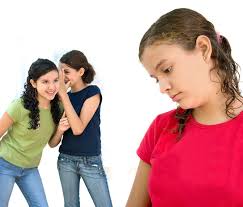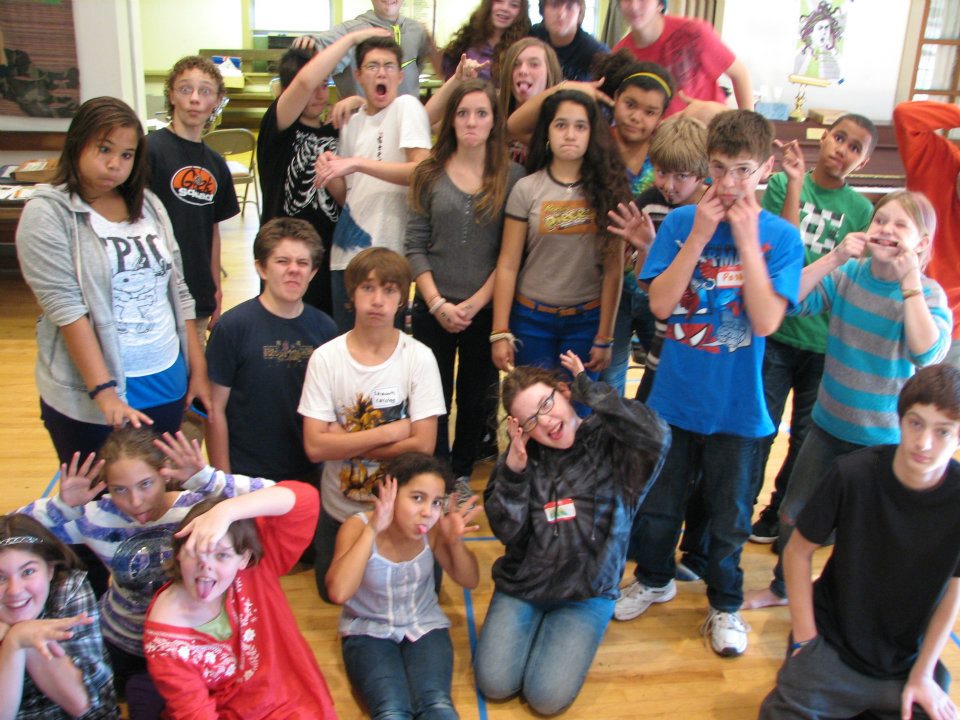|
|
July 30, 2015
 What’s wrong with you? Can’t you take a joke?! For better or for worse, our tweens and teens spend immeasurably more time with their friends than we did at their age. UOK wid dat? If we allow it, digital access enables them to connect every waking hour. These interactions strengthen interpersonal skills as often as they undermine them. Our kids must learn to set boundaries with other kids so they’ll develop confidence in who they are and what they need in a relationship.
Today’s question comes from a parent whose 10-year-old daughter has two challenging friendships.
Friend A says things to my daughter that undermine her confidence (“Everyone knows your writing sucks.”) but then laughs it off as a joke. Friend B is very sweet and kind, but too clingy. She always wants to do whatever my daughter does. Are there phrases she could use to help her tell the bitchy chick to change or go away, and to tell the lovely friend to be more independent?
– Frustrated Mom
Setting boundaries is something we all have to learn, because we need to teach people how to treat us. When we stay silent in the face of insults or we laugh along with the people mocking us, we send this message: “It’s OK for you to put me down.” Since that’s not the message your daughter wants to send, she needs to speak up for herself.
When Friend A makes nasty comments then hides behind “Just kidding!” your daughter needs confidence to let the girl know she just “crossed the line.” Ah, but how?
Many girls equate challenging a friend with being “mean” and that’s part of the reason they avoid “confrontations.” Make sure your daughter understands this isn’t a confrontation, it’s a respectful communication. Let her also know that standing up for herself (or others) doesn’t make her “mean” it makes her brave.
Advise your girl to stay calm and strong while she makes eye-contact, and simply speaks the truth. She might say something like this to Friend A: “That didn’t feel like ‘kidding’ to me. It hurts. If you’re really my friend, you won’t do that again.” Now Friend A has been put on notice and your daughter has taken back her power. If your daughter needs help saying these words, role play with her until she feels ready for the conversation. Hopefully this will work. If Friend A continues to make cutting remarks, then your daughter will have to continue standing up for herself and/or find the EXIT to this friendship.
In the case of “too clingy” Friend B… that’s a bit trickier. Your daughter has the right to choose who she spends time with but she doesn’t ever have the right to intentionally hurt anyone. (Remind her how it feels to be on the receiving end of one of Friend A’s zingers.) But that doesn’t mean she must continue to allow herself to be smothered in her clingy friend’s embrace. She might say something like this to Friend B: “I like spending some time with you but not all the time. I want to spend time with other friends, too. So today, let’s hang out together during lunch recess. Then tomorrow I’m going to hang out with Friend C.” That’s a clear communication and it is sensitive and respectful. Friend B may not be happy to hear that she won’t be with your daughter tomorrow, but if your daughter stays calm and delivers the message clearly and confidently, Friend B will (eventually) figure out that she needs to widen her friendship circle.

June 6, 2015
For the next few months my blog will focus on answering your parenting questions about raising tweens and teens as well as letting you in on some of the letters I get from tweens and teens. So if you’ve got something on your mind that you could use help with, send it to AskAnnie. (Of course it will be posted without any names, so no worries there.)
Today’s question: How do I keep my 11 yr old away from a bad friend?
 And you still think she’s your friend?! First you’ve got to realize that your definition of a “bad” friend might not be the same as your child’s. In fact, if your child has a history with this friend and is very attached, trying to pry her away will most likely land you smack in the middle of an ugly, pointless power struggle in which you will become the bad guy.
The most effective way to handle something like this is to help your child develop standards for what constitutes a good friend vs. the other kind. You can do it by making observations about what you see. For example, you might say, in a neutral voice, “You know, honey, I’ve noticed, when you come home from Jack’s house you’re usually in a bad mood. Sometimes you take it out on your sister. Sometimes you’re rude to me. I’m wondering what’s going on here?” Right then and there, you create a safe environment for your child to think about what you’ve observed and to let you in on where this chronic “bad mood after being with Jack” might be coming from.
Another approach is to share what you see when the two kids are together. You might say something like this, “I notice when Jack comes over, he seems to be bossing you around. Sometimes I hear bad language and I’m not happy with that. It seems like you two spend more time fighting than getting along. What’s up with that?” After an observational statement like this, simply close your mouth and listen to what your son or daughter has to say.
These techniques let you inside the mind of your child more effectively than provocative statements. (“You don’t actually like that awful boy, do you?!!”) Loaded questions like that don’t go over well with tweens and teens.
If you have good reasons, you are also perfectly within your rights to say, “Your friend is no longer welcome in our home and here’s why…” That conversation can be an eye-opener for your child and provide lots of food for thought.
Bottom line, the best way to influence tweens and teens in the direction of more positive friendships is to make neutral observations so the conversation can open up rather than shut down. That’s how to infuse your child with essential information about what it means to be a real friend.
I hope this helps. And until next time, happy parenting.

May 21, 2014
 Let’s figure out this friendship stuff together This is part 2 of the very cool Skype in the Classroom session I had Monday with a class of Philadelphia 8th graders. (Here’s Part 1) I’m all about giving students ongoing, safe places to get real about the challenges of friendships. It’s important to their personal well-being and to a positive school climate.
Student: Annie, what if you have friends who act cool when they’re with you but other times, when they’re with other people, they act really different with you?
What have you tried so far?
Student: I ask them, “Why do you act different with your friends than when you’re with me?” And they said, “I don’t know what you mean!”
All of that “I don’t know what you’re talking about!” is B.S. What you’re describing is The Switcheroo. When it’s just you and your friend, things are cool. Then you add one or two other people and suddenly you’ve switched channels and I don’t even know this person who is supposed to be my best friend. I’m wondering, “Why are you treating me this way?!”
Props to you for asking him what was going on. That was very brave. Most people would feel bad about the way they were being treated in, but they aren’t likely to talk about it. You took the extra step and I have a lot of respect for you.
So you asked your friend about it and he said, “I don’t know what you’re talking about.” That wasn’t true. He knew exactly what you’re talking about. But he didn’t feel proud of the way he’s been treating you, so he wouldn’t admit it.
If that happens again, I suggest you find the EXIT. You may not have ever thought of this, but there is an exit for every friendship. And sometime you just have to give yourself permission to walk through it. You can leave without making a big announcement. You can just say, “I’ll catch you later.” And you leave and spend time on your own doing thing or you hang out with other friends who treat you with more respect, or you take your dog for a walk. Whatever it is, just leave. Because there is no reason to stay with people who are not treating you well. Zero reason. Don’t do that.
Exactly how long do you stay away from this friend or friends? That depends. You could take a short vacation and the next day your friend may ask why you left. Be honest. You can say, “When you’re with other people you don’t treat me very well, so I left.” That gives him something to think about. And maybe the next time he’s with you and other people, he’ll treat you better. Or he won’t.
Sometimes, though, you go through the exit and you never come back to the friendship. And that’s ok too. Sometimes you end a friendship because you’ve outgrown it or because you get a new idea about how you want to be treated. It’s all ok. Just don’t talk about the person after you’ve gone through the exit. That’s not cool. It’s just gossip. Not important.
Before we ran out of time I asked the students what they usually learned in this class with this teacher. And they told me they learned math and science. This wasn’t the answer I expected, so I asked the teacher why he wanted his students to get a Skype lesson on Real Friends vs the Other Kind.
Teacher: We meet once a week, on Monday mornings, and have open discussions where people talk about their lives and share. And friendship is an important topic for us to talk about.
You guys are very lucky to have a teacher who prioritizes this stuff. Someone who says, “This may not be math or science, but it’s important. And I want to give you a platform to talk about it.” That’s awesome. There are not enough teachers like this one. You’re very lucky.

May 19, 2014
Since September I’ve been doing Skype in the Classroom sessions about Real Friends vs the Other Kind with 3rd-10th graders. (Even did one in Croatia!) Today I beamed into an 8th grade class in Philadelphia. Here are some of those students’ questions along with my answers. I’m sharing them to let you know that you are not alone in dealing with any of this stuff.
Student: What would you do if you had a friend you couldn’t trust but you were trying to give them a chance?
 We’re just a bunch of kids trying to figure out this friendship thing It’s good to give someone a second chance. We all make mistakes, right? Sometimes we’re in a bad mood and we’re rude. Sometimes we’re trying to impress other people and we end up hurting a friend. Before you give someone another chance, though, you have to talk about what happened. You can say, “What you did made me feel like I can’t trust you. I want to give you another chance, but first tell me what the heck was going on when you did that?!” A real friend will stop and think. They’ll say something like this: “I’m really sorry. This is why I did it. I promise I’m not going to do that again.” Then you can say, “Cool” and you move forward in the friendship.
But if your friend says, “I don’t know what you’re talking about!” They’re not taking responsibility for what they did. Even though you may want to trust them again, you haven’t really cleared up the problem. They don’t seem to understand what they did and why it wasn’t OK. Chances are good, they will do it again. If you still want to give them another chance, proceed with caution.
Student: If you’re friends with someone and you know that they’re talking about you, what should you do?
You can’t pretend that you don’t know it, so you have to talk about it. But watch your attitude. If I’m angry and I go my friend and say: “Hey, I heard that you’re talking about me. What’s up with that?!” your friend will feel attacked and will defend him or herself. They may say, “I don’t know what you’re talking about” when they actually know exactly what you’re talking about. Or they may be innocent and ask, “Who told you that?! It’s not true!” Maybe the person who told you was lying because they wanted to mess up your friendship. Bottom line here, if you need to talk to a friend about something important, get the facts first and don’t come out fighting. If you know the truth, calm down and say, “I know you’ve been talking about me and it makes me feel like you’re not a real friend.” Then you close your mouth and you listen to what they have to say. Afterwards, decide what’s right for you to do in this friendship.
Student: Have you ever felt like if you didn’t have a friend you weren’t like… normal?
There were times when I didn’t have a real friend. (That’s the only kind worth having.) It’s OK not to have friends if you know that you are friends with yourself. Being cool with who you are lets you be cool with spending time on your own. That’s way better than hanging out with people you don’t trust or respect. Not having a friend can be lonely and sometimes you might wonder, “What’s wrong with me? How come I don’t have at least one person who I’m really close with?” There’s nothing “wrong” with you. It might just be that the people around you are not a good match for you and for the kind of friend you are looking for. It may be that you’ve got high standards for yourself and for the people you call your friends. That’s a good thing.
If you aren’t finding real friends at school, look outside of school. At an afterschool club. Or a youth group. Or at the park. Just talk to people. I used to go to the library a lot when I was in middle and high school. There were kids there from other schools and I got to be friends with some of them.
If you need new friends or more friends… first you need to know what a real friend is. Make a list of what makes a Real Friend. Use it as your “shopping list.” For example, respect is a really important trait in a friend. You may see someone and say to yourself, “Is this person respectful? I don’t know him or her yet, but do I like what I see in the way this person treats others? Would I want a friend who treats me that way?” Think about what you’re looking for and keep your standards high, for yourself and for other people.
I hope this helps, and tune in next time, for Part 2 of Friendship Issues from the 8th grade. Til then, be a good friend to yourself and others.
 — Older Posts »
| |















